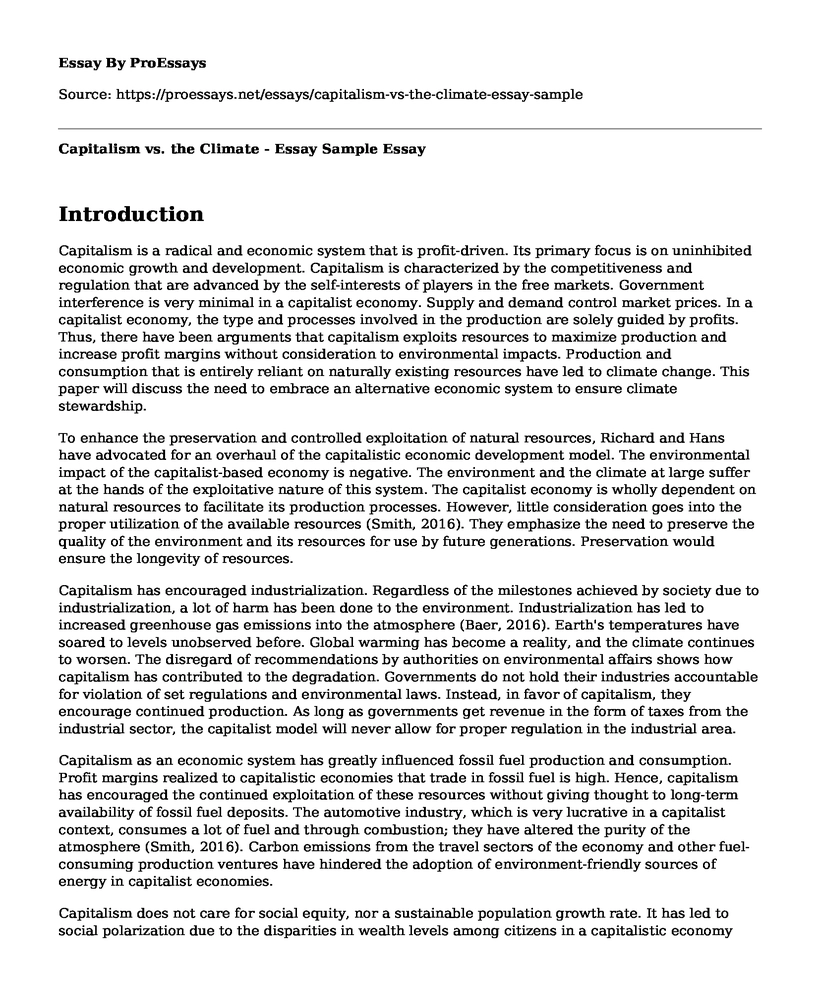Introduction
Capitalism is a radical and economic system that is profit-driven. Its primary focus is on uninhibited economic growth and development. Capitalism is characterized by the competitiveness and regulation that are advanced by the self-interests of players in the free markets. Government interference is very minimal in a capitalist economy. Supply and demand control market prices. In a capitalist economy, the type and processes involved in the production are solely guided by profits. Thus, there have been arguments that capitalism exploits resources to maximize production and increase profit margins without consideration to environmental impacts. Production and consumption that is entirely reliant on naturally existing resources have led to climate change. This paper will discuss the need to embrace an alternative economic system to ensure climate stewardship.
To enhance the preservation and controlled exploitation of natural resources, Richard and Hans have advocated for an overhaul of the capitalistic economic development model. The environmental impact of the capitalist-based economy is negative. The environment and the climate at large suffer at the hands of the exploitative nature of this system. The capitalist economy is wholly dependent on natural resources to facilitate its production processes. However, little consideration goes into the proper utilization of the available resources (Smith, 2016). They emphasize the need to preserve the quality of the environment and its resources for use by future generations. Preservation would ensure the longevity of resources.
Capitalism has encouraged industrialization. Regardless of the milestones achieved by society due to industrialization, a lot of harm has been done to the environment. Industrialization has led to increased greenhouse gas emissions into the atmosphere (Baer, 2016). Earth's temperatures have soared to levels unobserved before. Global warming has become a reality, and the climate continues to worsen. The disregard of recommendations by authorities on environmental affairs shows how capitalism has contributed to the degradation. Governments do not hold their industries accountable for violation of set regulations and environmental laws. Instead, in favor of capitalism, they encourage continued production. As long as governments get revenue in the form of taxes from the industrial sector, the capitalist model will never allow for proper regulation in the industrial area.
Capitalism as an economic system has greatly influenced fossil fuel production and consumption. Profit margins realized to capitalistic economies that trade in fossil fuel is high. Hence, capitalism has encouraged the continued exploitation of these resources without giving thought to long-term availability of fossil fuel deposits. The automotive industry, which is very lucrative in a capitalist context, consumes a lot of fuel and through combustion; they have altered the purity of the atmosphere (Smith, 2016). Carbon emissions from the travel sectors of the economy and other fuel-consuming production ventures have hindered the adoption of environment-friendly sources of energy in capitalist economies.
Capitalism does not care for social equity, nor a sustainable population growth rate. It has led to social polarization due to the disparities in wealth levels among citizens in a capitalistic economy (Smith, 2016). The limited resources are controlled by a few individual critical players in a capitalist economy. Poverty has been credited for the rapid population growth. Capitalism's view that a larger population implies a broader market for goods produced puts more pressure on production resources. Sustainability can be achieved if capitalism would invest in the society through public transport systems, public water systems, public health and organic farming. This would cut down profits for a capitalist economy. Thus, capitalism has steered clear of such investments and preferred continued plundering of the environment.
Conclusion
In conclusion, the need for adoption of an alternative economic system is apparent. Capitalism hinders progress towards resource conservation and preservation. The rate at which capitalist economies deplete natural resources is affecting biodiversity and the climate in the long term. Advocacy for an overhaul of the capitalist economic system is necessary if we are to salvage the environment. In order to reverse the effects of capitalism on the climate, an environment-friendly, sustainability-conscious economic policy should be adopted.
References
Baer, H. (2016). Toward democratic Eco-socialism as the next world system (pp. 1-26). Next System Project.Smith, R. (2016). Six theses on saving the planet (pp. 1-32). Next System Project.
Cite this page
Capitalism vs. the Climate - Essay Sample. (2022, May 04). Retrieved from https://proessays.net/essays/capitalism-vs-the-climate-essay-sample
If you are the original author of this essay and no longer wish to have it published on the ProEssays website, please click below to request its removal:
- Essay Sample - Air Pollution Toxicology
- Paper Example on Globalization and International Political Economy
- Environmental Impact of Personal Lifestyle Essay Example
- What Is Global Perspective? Essay Example
- Essay Example on Compensation Structure of Sprint Company
- Lebanese Apples Inc. New Market Entry Paper Example
- Women at the Frontline: Coronavirus Pandemic Response - Essay Sample







